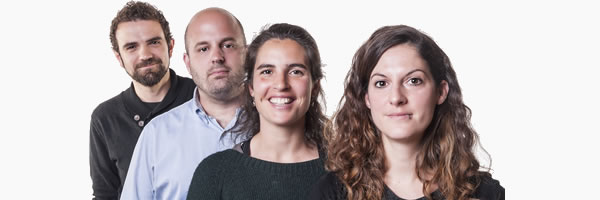Carles López: "Every coworking space is different in its community, atmosphere and managers"
- What is a psychologist like you doing working in a coworking space like CREC?
- What is coworking for you?
- Barcelona has the most coworking spaces in Spain, what makes CREC different from the rest?
- Could you define CREC in three figures?

- And in two words?
- At CREC, there are four of you in the management team; What does team work bring to the space and the community?
- A recurring theme in coworking spaces is finance, what factors do you think make a coworking space profitable?
- What is your community's main value?
- Does belonging to a coworking space's community have a certain therapeutic value?
- Do you have a filter for new members?
- In our case, we wanted a multi-disciplinary coworking space, meaning that there would be no filter on coworkers' professions.
- The people that use a coworking space are part of a community, that's just the way it is. What I am trying to say is that those people that don't want to respect others or the community rules, well, there's no place for them.
- Where do you see CREC being in 5 years' time? Do you think there'll be more CRECs open?
- In your opinion, what role do you think coworking will have on the work environment in the future?
Related posts
-
10 Award-winning Coworking Space Designs: A Comprehensive Guide
Vibrant, contemporary workspaces create an undeniable ‘wow’ factor. Textured designs and ambient lighting make spaces feel warm and cosy, while natural elements and biophilic design features have literal mood-boosting properties.
-
The Power of People: Building a World-Class Team in Coworking
Coworking spaces thrive on the “co” – the collaborations, connections, and community – that can be formed within a flexible workspace. In fact, community activation is what transforms shared workspaces from mere buildings into vibrant, thriving hubs that empower people in their professional lives and create meaningful community experiences.
-
6 Powerful Storytelling Techniques to Elevate Your Coworking Space
If you've been reading about coworking space design recently, you've probably come across an article or two that mentions narrative design and wondered what exactly it is and how it differs from traditional interior design, as well as how it can be used to improve design.
-
How Local Coworking Spaces Become Catalysts for Community Impact
Imagine swapping the 2-hour commute for a 15-minute bike ride to the office – what would you do with the time you’ve saved? You might use it to build a growing network of neighbours, spend more quality time with family, or even volunteer with a local organisation, becoming more deeply rooted in your community.
-
Niche Coworking Spaces: New Opportunities for Specific Industries in 2025
As demand for coworking continues to grow, niche coworking spaces stand out. Catering to the specific needs of distinct professional communities, these specialised workspaces go beyond just offering a desk and Wi-Fi. In fact, they provide tailored environments, resources, and networks enabling professionals to thrive in their respective fields. This article explores the opportunities these niche coworking spaces offer in various industries in 2025.
-
Evolving Needs of Flex Space Occupiers
Flex space industry growth has undeniably been accelerated by a major shift towards more flexible work models. Last year, 45% of office workers were hybrid, splitting their time between home, the office, and third places, reports Ipsos Karian & Box. Times are changing, bringing new expectations around the purpose of the office. At GCUC UK London, the panel discussion: “Evolving Occupier Needs in the Flex Space Market,” offered valuable insights into the transforming expectations of flex space occupiers. This article shares some of their conversations while exploring this topic further.